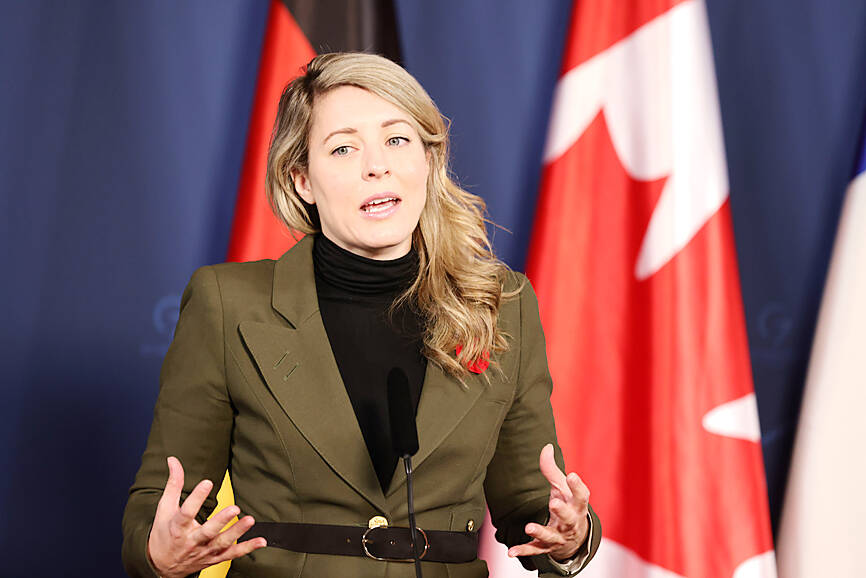Canada’s new Indo-Pacific strategy calls for changes to foreign investment screening as a result of concerns about Chinese state-owned enterprises, a development that comes less than two weeks after Chinese President Xi Jinping (習近平) lectured Canadian Prime Minister Justin Trudeau on the sidelines of a G20 summit.
Trudeau’s government is revising the Investment Canada Act, a key law governing foreign investment, to add new provisions to protect the country’s infrastructure, resources, technology, supply chains and intellectual property, according to a strategy document released yesterday.
The document does not outline specific amendments to the law, but says Canada is to act “decisively when investments from state-owned enterprises and other foreign entities threaten our national security.”

Photo: EPA-EFE
It is part of a section on the country’s new approach toward China, which Trudeau’s government describes as an “increasingly disruptive global power” that disregards international rules and norms.
“We need to make sure we protect our national security, period,” Canadian Minister of Foreign Affairs Melanie Joly said during an interview in Montreal. “The goal of reopening this act is really to make sure that we have an approach that is much more transparent and that brings predictability.”
Canada has already moved to limit Chinese investment in some critical minerals, ordering Chinese firms to divest from three junior lithium explorers earlier this month.
Also this month, police arrested a former Hydro-Quebec employee and charged him with espionage for allegedly obtaining trade secrets for China. The man was a researcher on battery materials.
Chinese foreign direct investment in Canada reached C$21 billion (US$15.67 billion) last year while Canadian direct investments in China were above C$14 billion, according to Statistics Canada.
Joly, who characterized herself as pragmatic, said the business community should know the geopolitical risks of dealing with China.
“My job is to highlight that,” she said, adding that diplomacy comes with “what we stand for,” even if it might harden relationships.

ADVERSARIES: The new list includes 11 entities in China and one in Taiwan, which is a local branch of Chinese cloud computing firm Inspur Group The US added dozens of entities to a trade blacklist on Tuesday, the US Department of Commerce said, in part to disrupt Beijing’s artificial intelligence (AI) and advanced computing capabilities. The action affects 80 entities from countries including China, the United Arab Emirates and Iran, with the commerce department citing their “activities contrary to US national security and foreign policy.” Those added to the “entity list” are restricted from obtaining US items and technologies without government authorization. “We will not allow adversaries to exploit American technology to bolster their own militaries and threaten American lives,” US Secretary of Commerce Howard Lutnick said. The entities

‘SWASTICAR’: Tesla CEO Elon Musk’s close association with Donald Trump has prompted opponents to brand him a ‘Nazi’ and resulted in a dramatic drop in sales Demonstrators descended on Tesla Inc dealerships across the US, and in Europe and Canada on Saturday to protest company chief Elon Musk, who has amassed extraordinary power as a top adviser to US President Donald Trump. Waving signs with messages such as “Musk is stealing our money” and “Reclaim our country,” the protests largely took place peacefully following fiery episodes of vandalism on Tesla vehicles, dealerships and other facilities in recent weeks that US officials have denounced as terrorism. Hundreds rallied on Saturday outside the Tesla dealership in Manhattan. Some blasted Musk, the world’s richest man, while others demanded the shuttering of his

Minister of Finance Chuang Tsui-yun (莊翠雲) yesterday told lawmakers that she “would not speculate,” but a “response plan” has been prepared in case Taiwan is targeted by US President Donald Trump’s reciprocal tariffs, which are to be announced on Wednesday next week. The Trump administration, including US Secretary of the Treasury Scott Bessent, has said that much of the proposed reciprocal tariffs would focus on the 15 countries that have the highest trade surpluses with the US. Bessent has referred to those countries as the “dirty 15,” but has not named them. Last year, Taiwan’s US$73.9 billion trade surplus with the US

Prices of gasoline and diesel products at domestic gas stations are to fall NT$0.2 and NT$0.1 per liter respectively this week, even though international crude oil prices rose last week, CPC Corp, Taiwan (台灣中油) and Formosa Petrochemical Corp (台塑石化) said yesterday. International crude oil prices continued rising last week, as the US Energy Information Administration reported a larger-than-expected drop in US commercial crude oil inventories, CPC said in a statement. Based on the company’s floating oil price formula, the cost of crude oil rose 2.38 percent last week from a week earlier, it said. News that US President Donald Trump plans a “secondary